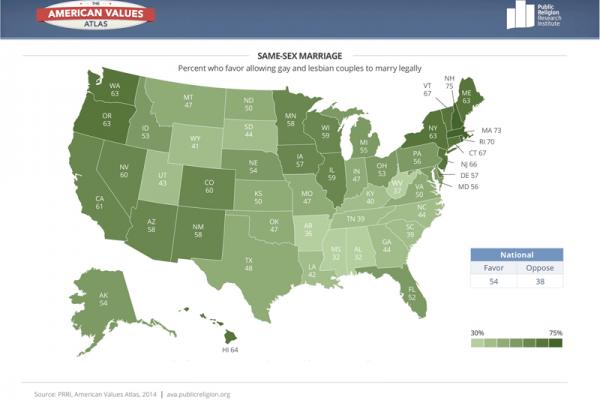The Supreme Court ruling June 26 to legalize gay marriage rested in pragmatic legal reasoning, the same approach in the June 25 ruling on the Affordable Care Act — the decision that saved Obamacare from a “death spiral.”
Justice Anthony Kennedy, author of the majority opinion in the 5-4 decision, described equal protection under the law as an inevitable step in the evolution of changing understandings of marriage across the centuries and essential for the safety and dignity of thousands of gay and lesbian couples and their children.
“The nature of injustice is that we may not always see it in our own times,” Kennedy wrote after recounting the legal struggles faced by same-sex partners.
In his dissent, Chief Justice John Roberts wrote that the court had taken an “extraordinary step” in deciding not to allow states to decide the issue, according to NPR. An outraged Justice Antonin Scalia blasted the ruling as offering the moral weight of a “fortune cookie.”
At first look, there would seem to be no parallels between the statutory language wrangle at the heart of the ACA case (King v. Burwell) and the constitutional showdown in the quartet of cases on the legality and recognition of same-sex marriage across the nation (Obergefell v. Hodges).
However, the clue may be woven into the legal reasoning behind the decision in King v. Burwell in the opinion written by Roberts.
Roberts’ majority opinion seemed to argue a pragmatic concern for the real-world impact of a ruling that could have cut off millions of people from access to subsidized health insurance coverage through state exchanges.
“Congress passed the Affordable Care Act to improve health insurance markets, not to destroy them,” Roberts wrote. To dismantle the law by ending the subsidies would “destabilize the individual insurance market in any state with a federal exchange, and likely create the very ‘death spirals’ that Congress designed the act to avoid.”
So how did such pragmatic reasoning play in the gay marriage ruling?
The justices knew the map of change: 70 percent of Americans live in places where same-sex marriage is now legal. Only 13 states banned it.
They were aware of the polls on gay marriage: six in 10 Americans, a record-high number, favor legalization nationwide.
Kennedy certainly echoed Solicitor General Donald B. Verrilli Jr.’s argument, that:
“In a world in which gay and lesbian couples live openly as our neighbors, they raise their children side by side with the rest of us, they contribute fully as members of the community … it is simply untenable — untenable — to suggest that they can be denied the right of equal participation in an institution of marriage, or that they can be required to wait until the majority decides that it is ready to treat gay and lesbian people as equals.”
Those facts on the ground helped point a majority of justices toward a ruling that overturns all remaining state bans while four conservatives took a different approach, a text-based reasoning that looks no further than the Constitution, not to 21st-century facts.
Just a few days ago Emily Bazelon elaborated on pragmatism and formalism in an analysis she wrote for The New York Times Sunday Magazine on how judges make up, or change, their minds:
“The idea that a judge should consider evidence about a law or a ruling’s effects has been a central tenet of legal thinking since at least the early 20th century. In that period, scholars known as legal realists challenged the opposing conception — usually called formalism — that law should logically derive from abstract principles. The realists wanted judging to be grounded pragmatically in evidence about consequences. Today the debate between legal realism and formalism is entangled in politics. Formalists say that realism (or pragmatism, a related concept) is just a cover for a judge to impose his or her own ideological values.”
Bazelon speculated that Roberts may be swayed by the pragmatic concerns of cutting off subsidies for millions of people — neatly foreshadowing the ruling.
And Scalia — whom she called “the country’s foremost formalist” in the Sunday paper — wrote a scathing dissent on the ACA ruling. He called the majority opinion “interpretive jiggery-pokery.”
In the June 26, 2013, decision that overturned the Defense of Marriage Act, Scalia, the formalist, wrote a rhetorical question in his dissenting opinion: “(W)hat justification could there possibly be for denying the benefits of marriage to homosexual couples exercising ‘the liberty protected by the Constitution’?”
Friday, in dissenting on gay marriage, his outrage was stratospheric. He wrote:
“If, even as the price to be paid for a fifth vote, I ever joined an opinion for the Court that began: ‘The Constitution promises liberty to all within its reach, a liberty that includes certain specific rights that allow persons, within a lawful realm, to define and express their identity,’ I would hide my head in a bag. The Supreme Court of the United States has descended from the disciplined legal reasoning of John Marshall and Joseph Story to the mystical aphorisms of the fortune cookie.”
Let’s see what happens next. My bet, a bloody battle for national employment and housing nondiscrimination laws as newlywed same-sex couples face the prospect of losing their jobs or housing with no federal protection. What facts on the ground will come to the high court then?
Got something to say about what you're reading? We value your feedback!
